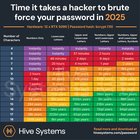 In the evolving landscape of cybersecurity, the humble password is no longer the fortress it once was. While passwords remain a primary method for protecting digital assets, their effectiveness has diminished over time. With the rise of sophisticated cyber threats and the increasing value of our digital identities, understanding the importance of password security has never been more critical.
In the evolving landscape of cybersecurity, the humble password is no longer the fortress it once was. While passwords remain a primary method for protecting digital assets, their effectiveness has diminished over time. With the rise of sophisticated cyber threats and the increasing value of our digital identities, understanding the importance of password security has never been more critical.
The Changing Password Landscape
In the early days of the internet, a simple combination of a word and a few numbers sufficed as a secure password. Today, that’s no longer the case. The modern threat landscape is filled with attackers armed with advanced tools and techniques that make it alarmingly easy to crack weak or reused passwords. Even passwords once considered "strong" can now be compromised in seconds using automated attacks.
One major vulnerability is that people often reuse the same password across multiple sites. If one site suffers a data breach, attackers can use the leaked credentials to access other accounts, a tactic known as credential stuffing. Additionally, the increasing reliance on cloud services and online platforms expands the number of entry points for hackers, making password hygiene even more essential.
How Passwords Are Bypassed
Cybercriminals use various techniques to obtain passwords. Phishing attacks remain one of the most effective. These attacks trick users into entering their credentials into fake websites or responding to malicious emails. Even savvy users can fall victim to cleverly disguised phishing scams.
Brute force attacks are another common tactic, where attackers use automated tools to guess passwords at high speed. With enough computing power, short or simple passwords can be cracked quickly. Dictionary attacks, where attackers try commonly used words and phrases, are also widely used.
Even seemingly complex passwords can be vulnerable if they follow predictable patterns or are included in previously leaked password databases. The bottom line: if your password is not unique, long, and randomly generated, it's probably not secure.
Best Practices for Password Security
To safeguard your data, it's important to follow modern best practices for creating and managing passwords:
- Use long, complex passwords with a mix of letters, numbers, and special characters. Avoid using dictionary words, names, or patterns.
- Never reuse passwords across different services.
- Use a password manager to generate and securely store unique passwords for every site and service.
- Regularly update passwords, especially after a security breach or suspected compromise.
Go Beyond Passwords: Embrace Two-Factor Authentication and Biometrics
Even strong passwords have limitations, which is why multi-factor authentication (MFA) is essential. With Two-Factor Authentication (2FA), even if an attacker gets your password, they still can’t access your account without the second factor—usually a code sent to your phone or generated by an authentication app.
Biometric authentication methods like fingerprint scanning or facial recognition offer an additional layer of protection. These methods are difficult to replicate and provide a convenient, secure alternative to traditional passwords.
Final Thoughts
Passwords are still a vital part of digital security, but they shouldn’t be your only line of defense. In an age where cyber threats are growing in frequency and sophistication, combining strong password practices with tools like 2FA and biometrics is the best way to protect your data, your identity, and your peace of mind. If you’re tired of dealing with the constant threat of malicious attacks, cyber criminals, and the constantly changing landscape of IT security, than it’s time to partner with the Security Specialists in all things IT, Networks, and Data. Give us a call today, and learn how Natural Networks can help maintain your companies IT and Security!



